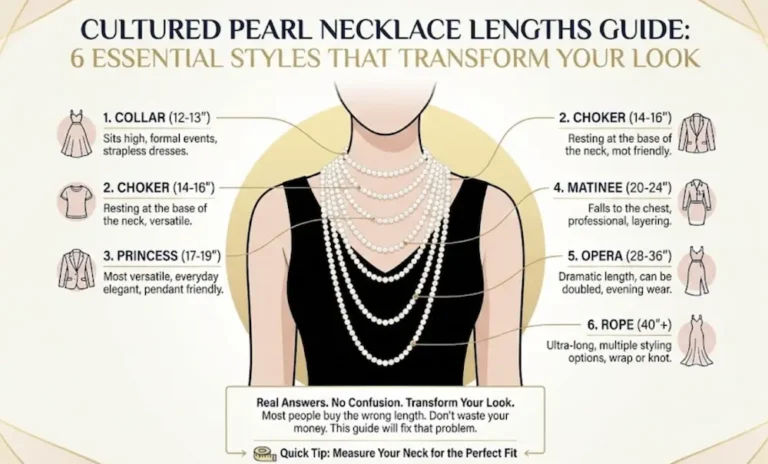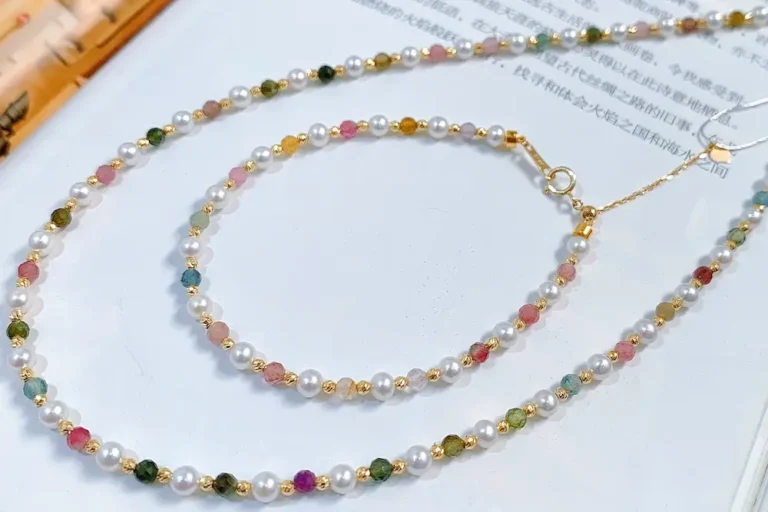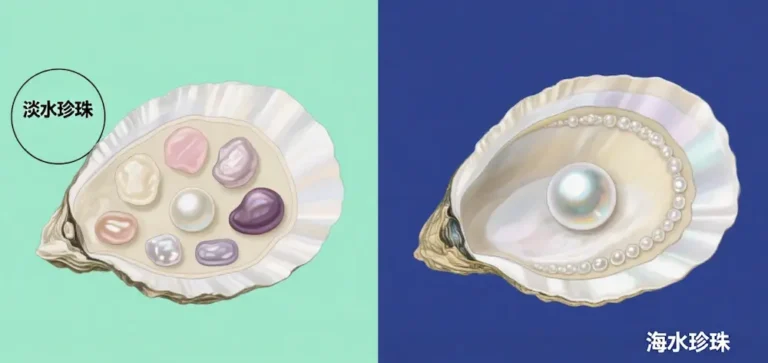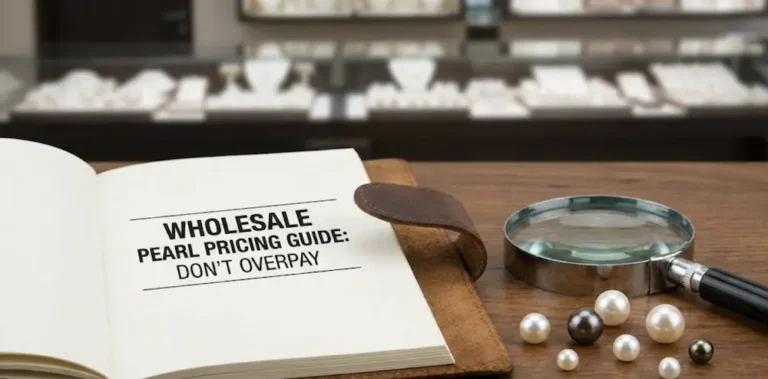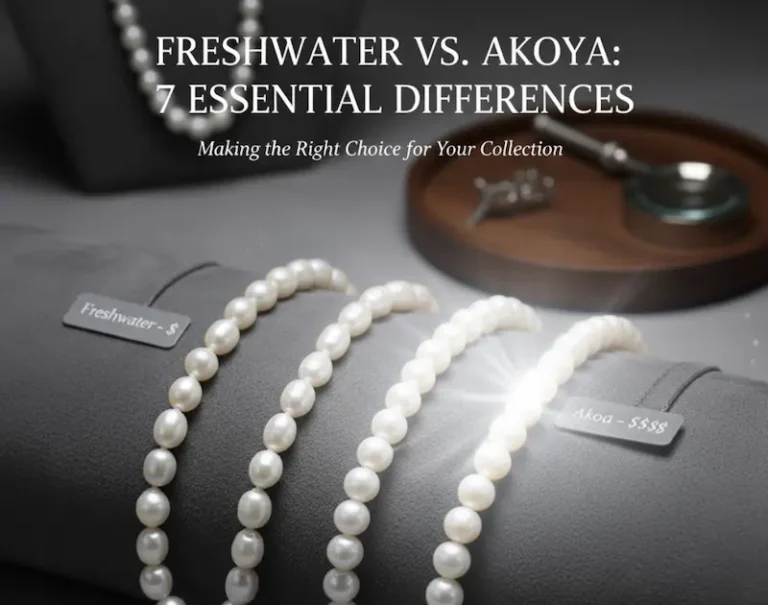The pearl business has been going strong for years, but finding a pearl supplier you can trust is still one of the trickiest parts of being in the jewelry world. Whether you’re opening a small jewelry shop or adding to your current selection, asking the right questions before you buy wholesale pearls can be the key to success or a path to expensive errors.
A lot of jewelry sellers learn this the hard way, finding out too late that their supplier gave them low-quality pearls, inconsistent grading, or deliveries that were always late. The result? Unhappy customers, a bad reputation, and a lot of money lost.
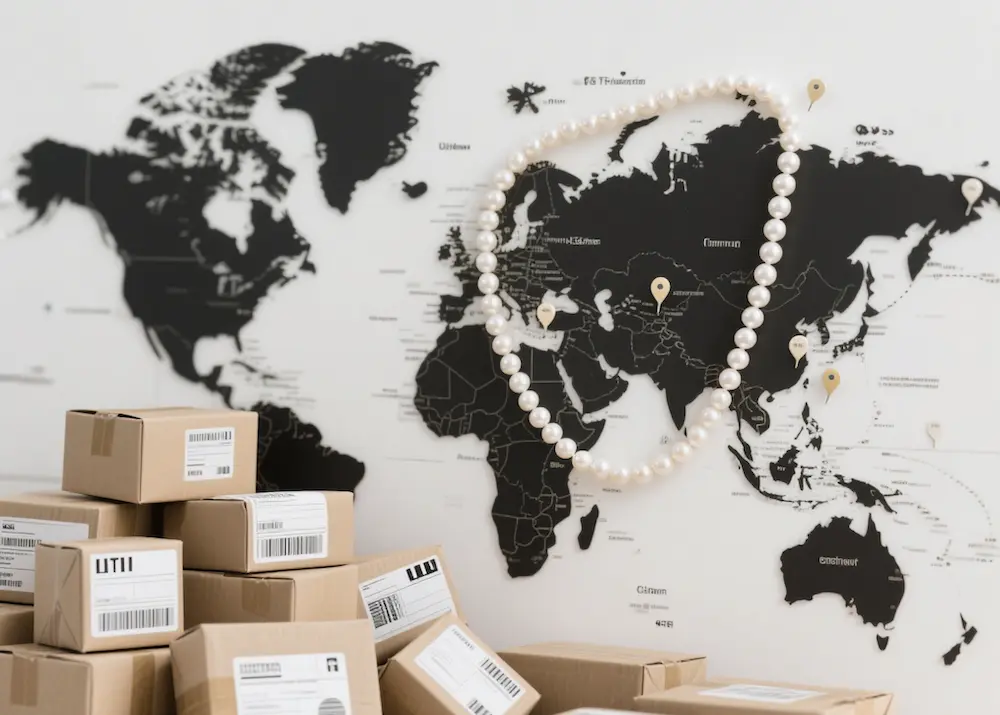
This guide will give you the key questions to ask suppliers, helping you find reliable partners who can provide wholesale pearls that help your business grow. We’ll cover everything from checking the quality of the pearls to the practical side of doing business, making sure you can make smart choices in the tough pearl market.
Understanding Your Pearl Supplier’s Background and Experience
Years in Business and Industry Reputation
To start, find out how long the pearl supplier has been in business. Pearl suppliers that have been around for a while have usually been through different market conditions and have good business practices. Companies that have been around for 10 years or more usually know more about the industry and have stronger ties to pearl farms.

Find out what kinds of clients they work with. Do they sell to both small and large stores? Having lots of different types of clients shows that they’re reliable and can adapt to different needs. Also, see if you can talk to some of their current customers who run businesses like yours. This can help you figure out how well the supplier does their job, how easy it is to talk to them, and how well they deal with problems.
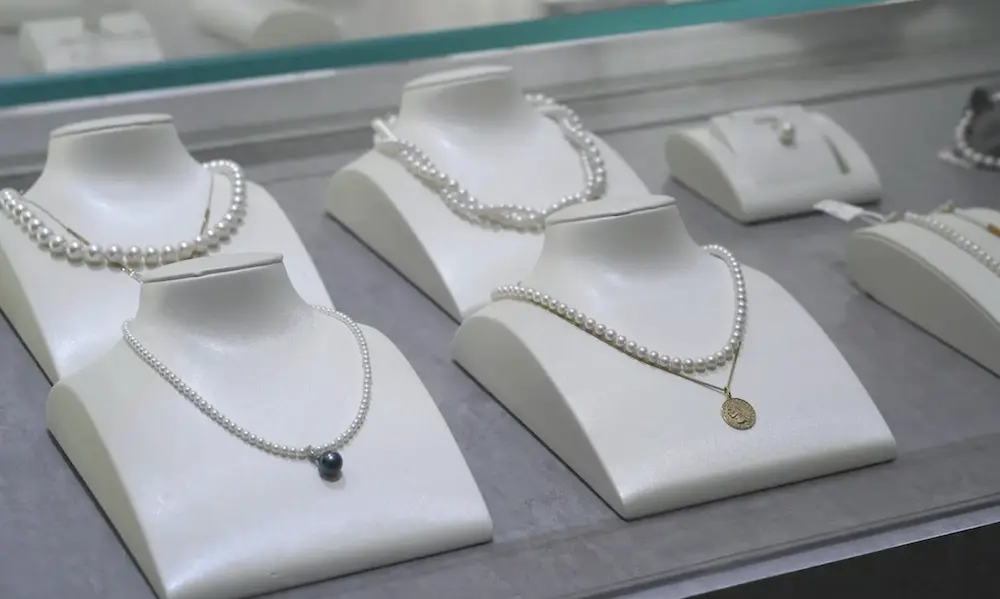


It’s very important for them to have a good name in the business. Check to see if they are in good standing with trade groups, read reviews on the internet, and look for any complaints or legal issues. Good pearl supplier often attends pearl trade shows, belong to jewelry associations, and have connections with Pearl Manufacturer.
Geographic Location and Supply Chain Transparency
It’s really important to know where your pearl supplier is located and how their supply chain works. Most of the time, freshwater pearls come from China, Akoya pearls come from Japan, and South Sea pearls come from Australia and the Philippines.
Find out if they get their pearls directly from the farms or through middlemen. Buying directly often means better prices, better quality, and a steady supply. However, some pearl suppliers are good at combining pearls from different places, which gives you more variety and competitive prices.
Think about the logistics, too. Suppliers near big shipping centers, who often specialize in wholesale pearls, usually offer faster delivery and cheaper shipping. International suppliers might save you money, but they’ll probably take longer to deliver and involve more complicated import stuff.
Quality Standards and Grading Systems
Pearl Grading Methodology
A good pearl supplier should always use the same grading standards. While there isn’t a universal system like there is for diamonds, good suppliers use established frameworks like the AAAAA-A system or the A-D system.
Ask them to explain their grading criteria in detail. How do they judge things like shine, surface quality, shape, and size? Do they give out certificates for grades? Consistent grading makes sure you get what you expect and helps keep your inventory prices fair.
Before you order a lot, ask for samples of different grades. Compare pearls from different grades to see the quality differences and how the pricing works. This hands-on experience helps you figure out which grades are best for the customers you’re targeting.
Quality Control Processes
You can tell a lot about how serious a pearl supplier is about quality by looking at their quality control process. Ask them how they check things. Do they look at every single pearl, or do they just check a few? What do they do if they find pearls that aren’t up to par?
Inquire about their return and exchange policies for quality issues. Reliable suppliers stand behind their products and offer reasonable solutions when problems arise. Some provide quality guarantees or replacement guarantees for legitimate defects.
Document their quality standards in writing. This protects both parties and ensures clear expectations. Set acceptable rates of defects, how to replace them, and how to settle quality disputes.
Product Range and Inventory Management
Available Pearl Types and Sizes
Good pearl supplier relationships often involve a variety of pearl choices. So, see how deep their inventory is across different types of pearls – freshwater, Akoya, Tahitian, and South Sea. Do they have both cultured and natural pearls? What about special items like baroque pearls or unusual colors?
Size availability is a big deal too. Can they always offer popular sizes, like 7–8 mm for necklaces or 8–9 mm for pendants? Do they offer matching services for pearl strands that need to be the same size?
Also, keep in mind that seasonal availability changes depending on the pearl type. Some suppliers have inventory year-round, while others depend on harvest schedules. Understanding these patterns will help you plan your purchases better.
Inventory Turnover and Freshness
Because pearls are organic, managing pearl inventory is different from managing other gemstones. Find out how fast their stock moves and how they keep their pearls. Pearls that are new usually have a better shine and fewer flaws than pearls that have been around for a while.
Some suppliers only buy pearls after a customer places an order, which is called a pre-order system. This keeps them fresh, but it also means you’ll have to wait longer to get your pearls. Some suppliers keep a lot of stock on hand so they can ship it right away, but their stock might have older pearls mixed in with the newer ones.
Inquire about their inventory tracking systems. Can they identify when specific lots were acquired? This information helps you prioritize newer inventory when placing orders.
Pricing Structure and Payment Terms
Wholesale Pricing Models
It’s important to know how much pearl suppliers charge in order to build strong relationships with them. Some businesses use tiered pricing, which means that the price per pearl goes down as you buy more. Some businesses have a set wholesale price that doesn’t change based on how many you order.
Also, ask them how stable their prices are. How often do they change the prices? Do they tell you ahead of time if prices are going up or down? The pearl market can be a little unpredictable, but trustworthy suppliers try to keep prices from changing too quickly by planning their purchases and keeping track of their stock.
Make sure to compare prices from different pearl suppliers, but remember that the cheapest price isn’t always the best deal. When you’re looking at prices, think about the overall quality, the level of service they offer, and the total cost of doing business with them.
Payment Terms and Credit Policies
How and when you pay your supplier can really impact your cash flow. Many well-established suppliers will give you 30 to 60 days to pay, if you qualify. Some others want payment right when the pearls are delivered, or even upfront for special orders.
When you apply for credit with a supplier, they’ll usually ask for your company’s financial statements, references from other businesses you’ve worked with, and sometimes even a personal guarantee. Make sure you understand their credit approval process and what they require before you place any big orders.
Some suppliers give you a discount if you pay early, or they might have special payment plans at certain times of the year. These kinds of deals can help you make more money and get to know your supplier better at the same time.
Business Support and Services
Technical Support and Education
The best suppliers don’t just sell pearls; they also share their knowledge. Ask them about their technical support. Can they give you advice on how to care for, store, and handle the pearls? Do they have training materials to help your sales team learn more about the product?
Educational materials are very useful! It is easier for you to give your customers great service when suppliers give you things like information about pearls, care instructions, and selling guides. This is especially helpful if you’re just starting out selling pearls.
Some suppliers will even help you with marketing, providing photos, product descriptions, and materials for promotions. This can help you save money on advertising and make sure everything looks good.
Customer Service and Communication
Good communication is key to a great relationship with your pearl supplier. Pay attention to how quickly they respond when you first reach out. Do they get back to you quickly by phone or email? When you ask them technical questions, do they know what they’re talking about?
Learn how they like to talk and when they are free. If you work with a supplier in another country, keep in mind that they may be in a different time zone, which could make it hard to reach them. If you know this ahead of time, it can save you trouble later.
Also, ask if they have a way for you to track your orders. Can you see where your shipment is online? Do they let you know if there are any delays or problems? Open and honest communication helps you manage your customer’s expectations and plan your inventory.
Shipping and Logistics
Delivery Options and Timeframes
How your supplier handles shipping will really affect whether you can get products to your customers quickly. Ask them how long it usually takes for orders to arrive, depending on the type of order. “Rush” orders usually cost more, but they might be necessary if you need something fast.
It can be hard to ship things to other countries. Know how customs works, how duties are figured out, and what paperwork you need. Some suppliers do all of this for you, while others expect you to do some of it.
It’s also a good idea to insure your shipments in case something gets lost or broken. Find out what kind of insurance the supplier has and how to file a claim. If you’re sending something expensive, you might want to ask for special handling or require a signature when it arrives.
Packaging and Product Protection
Because pearls are so delicate, how they are packaged is very important. Ask your pearl supplier how they pack the pearls. Do they use special boxes, separate bags, or foam to protect things? Good packaging will prevent damage during shipping and also make a great first impression when the pearls arrive.
Some pearl suppliers will let you use your own branded packaging or create custom labels. This can make your brand look even better and might even save you money on packaging in the long run.
Don’t forget that the shipping cost might be listed separately from the actual price of the item. To get a clear picture of what you’ll really be paying, make sure you understand all the fees involved. Some suppliers include simple packaging at no extra charge but will charge more for a more premium option.
Building Long-term Partnerships
Growth Support and Scalability
If you want your jewelry business to do well, you need pearl suppliers who can grow with you. Ask them if they can handle bigger and bigger orders as your business grows. Can they still provide good service and high quality when they are very busy?
If you buy a lot from a supplier, they might give you exclusive rights to sell their products in a certain area or give you special deals. You might be able to get ahead of the competition with these kinds of deals, but they usually mean you have to buy a certain amount.
Chat with them about their ability to create new products. As your business evolves, can they find unique items or craft custom designs to match your specific needs? Great suppliers are always innovating, bringing fresh ideas to the table, and helping their customers stay competitive.
Contract Terms and Agreements
It is smart to have a written contract because it protects both you and the supplier and makes sure everyone knows what is going on. Take a close look at the contract they propose, paying special attention to things like how much you have to order, whether you’ll be the only one selling their product in your area, and how you can end the agreement if needed.
Just a heads-up: some suppliers will require you to buy a certain amount each year to keep your wholesale account. Make sure you know what those commitments are before you sign anything. Others might be more flexible, but the price you pay could change depending on how much you actually buy from them.
Dispute resolution procedures should be clearly defined. How are quality disagreements handled? What about delivery delays or pricing disputes? Having a clear process in place helps stop small hiccups from turning into big headaches.
Red Flags to Watch For
Warning Signs of Unreliable Suppliers
Here are some red flags to watch out for when dealing with pearl supplier. If they won’t give you samples, dodge questions about quality, or pressure you into making a huge first order, they might not be the best partners for you. They might be looking out for themselves more than they’re looking out for you.
Be careful of suppliers whose prices seem too good to be true. A good deal is great, but if the prices are really low, it could mean that they’re skimping on quality or that their business isn’t stable.
It’s also a red flag if a supplier is hard to reach, gives vague answers, or seems disorganized before you even place an order. Chances are, the communication will only get worse once you’re actually buying from them, and that can lead to a lot of headaches.
Protecting Your Business Interests
Make sure to keep a written record of everything – all your conversations and agreements. This keeps everyone safe and gives you something to look back on later. Sending a short email to confirm what you talked about on the phone can help avoid a lot of confusion later on.
It’s a good idea to place a small order with a new pearl supplier before placing a larger one. You can check the quality of their goods, see if they deliver on time, and get a sense of their customer service without spending a lot of money.
You should try to meet a few different pearl suppliers. If one supplier has problems, you won’t be left high and dry this way. Also, having more than one choice can help you get better deals when you haggle.
Industry Resources and Authority Links
The Gemological Institute of America (GIA) is the last place you should go if you want to learn everything there is to know about pearls. They have a lot of useful information and grading standards that can help you figure out how good a pearl is.
The Pearl Association of Americais also a good place to learn about and follow industry standards. They can really help you evaluate your suppliers and make sure you’re getting the best deal.
Conclusion: Making the Right Choice
Picking the right pearl supplier means you have to look closely at a lot of things. You need to think about their quality standards, how they do business, how they price their pearls, and how good their customer service is. All of these things play a part in building a good working relationship. The questions in this guide will help you really dig in and figure out if a supplier is the right fit for you.
Keep in mind that the cheapest wholesale pearls aren’t usually the best deal in the long run. It’s best to work with suppliers who are trustworthy, dependable, and really want to help your business grow. Building those strong relationships takes effort, but it’s worth it because you’ll get better pearls, better prices, and better service.
Really take your time to check out any pearl suppliers you’re thinking about using. Ask for samples, talk to their other customers, and maybe start with a small order to see how they do. Putting in that extra work at the beginning can save you from making expensive mistakes and help you build a solid base for your business in the long run.
The supplier you choose for your wholesale pearls will have a big impact on how well your jewelry business does. Use these tips to find partners who care as much as you do about quality and keeping customers happy. With the right supplier on your side, you’ll be in a great spot to build a successful pearl jewelry business that takes care of customers and makes a good profit.
Table 1: Key Supplier Evaluation Criteria
| Criteria | Weight | Evaluation Method |
|---|---|---|
| Quality Standards | 30% | Sample testing, grading consistency |
| Pricing | 25% | Market comparison, total cost analysis |
| Service Level | 20% | Response time, problem resolution |
| Reliability | 15% | Delivery performance, inventory stability |
| Business Terms | 10% | Payment terms, contract flexibility |

